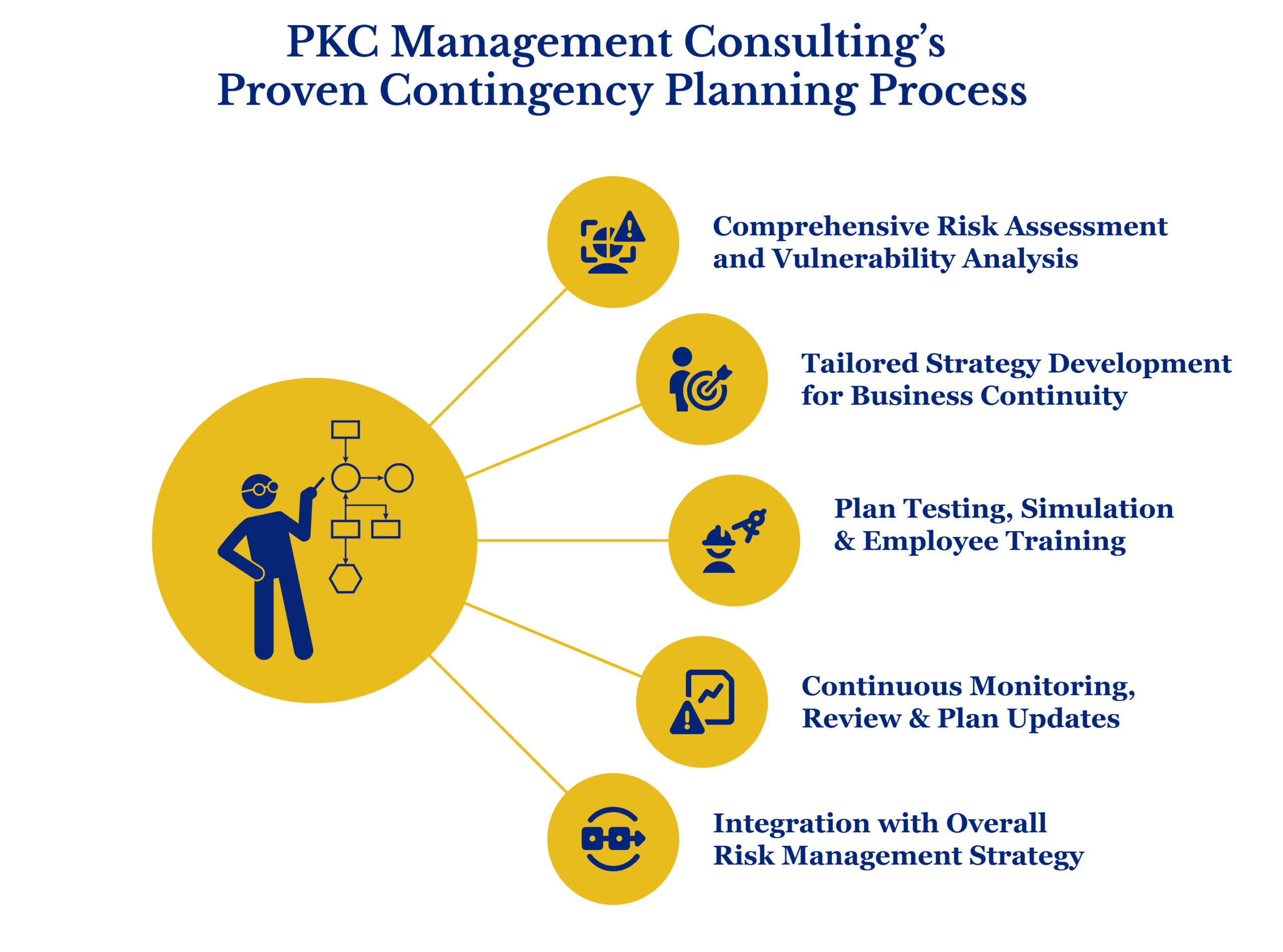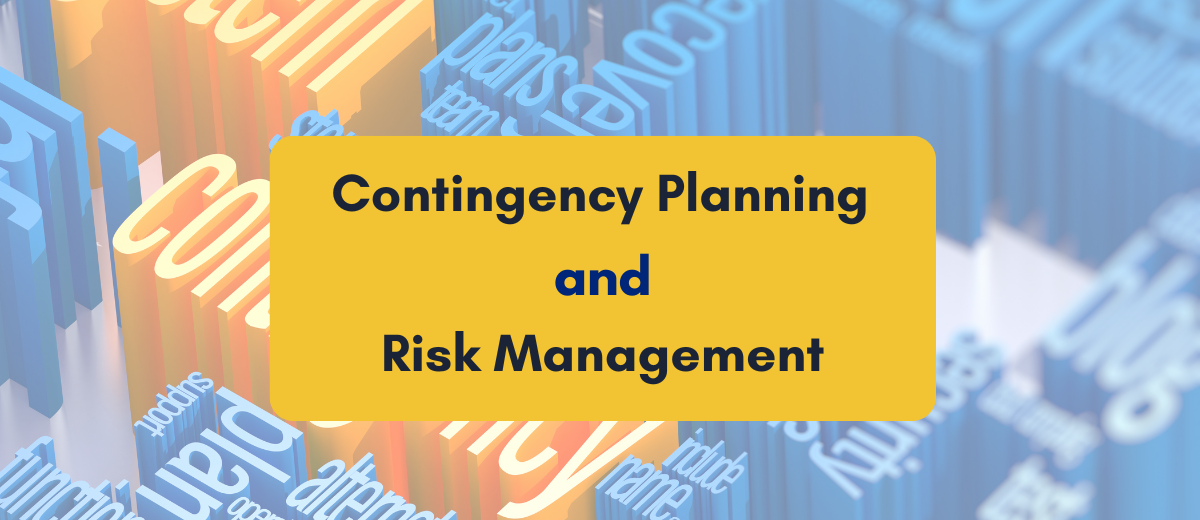Written By – PKC Desk, Edited By – Abinesh, Reviewed By – Balaji Prasad
Risk management plays a crucial role in ensuring the stability and success of organizations. One essential aspect of risk management is contingency planning.
In this blog, we will explore the significance of contingency planning and how it helps organizations prepare for unforeseen events and mitigate their impact.
What is Contingency Planning?
Contingency planning is the proactive process by which an organization prepares to respond effectively to unexpected events or emergencies. that could disrupt normal operations or processes.
It involves identifying possible risks or crises (such as natural disasters, financial challenges, supply chain disruptions, or technological failures) and creating predefined responses to minimize their impact.
The main purpose of contingency planning is:
- Ensure Continuity: Minimize downtime and maintain critical functions.
- Mitigate Impact: Reduce damage to assets, reputation, finances, and personnel.
- Enable Rapid Recovery: Get back to normal operations as quickly and smoothly as possible.
- Manage Uncertainty: Provide a sense of control and direction during chaos.
Contingency Planning V/s Risk Management
Risk management and contingency planning are closely linked to each other but are different in their approach:
Aspect | Contingency Planning | Risk Management |
Definition | Developing plans to respond to potential future events/crises | Identifying, assessing, and mitigating risks before they occur |
Focus | Response and recovery | Prevention and reduction of risks |
Timing | Activated after an event/ crisis occurs | Implemented before risks happen |
Goal | Ensure business continuity and minimize impact of disruptions | Minimize likelihood and impact of potential risks |
Involvement | Typically involves crisis management teams | Involves stakeholders across functions (e.g., finance, operations, legal) |
Approach | Reactive | Proactive |
Scope | Specific to high-impact, low-probability events | Broader, covering all types of potential risks |
Output | Actionable response plans | Risk register, mitigation strategies, monitoring systems |
How Contingency Planning Fits Into Risk Management Strategies?
Contingency planning is a critical, integrated component within a comprehensive risk management strategy. Here’s how it fits in:
- Addresses Residual Risk: After identifying risks and applying treatments , contingency planning handles the remaining (residual) risk or accepted risks – the “what if it happens anyway?”
- Focuses on Critical Impacts: It targets events that would disrupt critical business functions identified through Business Impact Analysis (BIA).
- Enables Risk Acceptance: It makes deliberately accepting certain risks viable by providing a plan to manage the consequences.
- Operationalizes Response: While risk management defines strategies, contingency planning provides the detailed procedures for responding and recovering when a risk materializes.
- Builds Resilience: It’s a core tool for ensuring the organization can withstand, recover from, and adapt to disruptions.
Key Benefits of Effective Contingency Planning for Organizations
Minimize Disruptions and Financial Losses
Contingency planning helps organizations prepare for unexpected events such as natural disasters, supply chain disruptions, or technological failures.
By having a well-defined plan in place, businesses can minimize downtime and quickly resume operations, reducing financial losses.
This approach allows organizations to navigate disruptions more effectively and maintain their competitive edge.
Enhance Business Resilience and Reputation
Contingency planning strengthens an organization’s ability to withstand and recover from adverse events.
By anticipating potential risks and developing response strategies, businesses can adapt swiftly, maintain customer trust, and protect their reputation.
Effective contingency planning enables organizations to bounce back quickly and continue delivering products or services, even in challenging circumstances.
Ensure Employee Safety and Well-being
Contingency planning includes measures to ensure the safety and well-being of employees during emergencies.
By having clear protocols in place, organizations can effectively communicate and coordinate actions, prioritizing the safety of their workforce.
This not only protects employees but also fosters a sense of security and loyalty within the organization.

PKC Management Consulting’s Proven Contingency Planning Process
Comprehensive Risk Assessment and Vulnerability Analysis
PKC Consulting begins the contingency planning process by conducting a thorough risk assessment for the organization.
This involves identifying potential risks and vulnerabilities specific to the industry, location, and business operations.
By analyzing historical data, industry trends, and conducting site visits if necessary, we gain a comprehensive understanding of the risks that could impact the organization. This step forms the foundation for developing a robust contingency plan.
Tailored Strategy Development for Business Continuity
Based on the risk assessment, PKC develops a customized contingency plan that addresses the specific needs and challenges of the organization.
They collaborate with key stakeholders to ensure that the plan covers all critical areas and aligns with the organization’s overall risk management strategy.
This tailored approach ensures that the contingency plan is practical, effective, and relevant to the organization’s unique circumstances.
Plan Testing, Simulation, and Employee Training
PKC Consulting recognizes the importance of testing and refining contingency plans to ensure their effectiveness.
They assist organizations in conducting simulations, tabletop exercises, or full-scale drills to test the plan’s response capabilities. Through these exercises, PKC identifies any gaps or areas for improvement, allowing the organization to refine their plan and enhance its effectiveness.
Additionally, we provide training to employees, ensuring that everyone is well-prepared to execute the plan effectively in real-life scenarios. This training enhances the organization’s overall readiness and ensures a coordinated response during emergencies.
Continuous Monitoring, Review, and Plan Updates
Contingency planning is an ongoing process that requires regular monitoring and updates. PKC Consulting emphasizes the importance of staying vigilant and adapting to evolving risks and business environments.
They work closely with organizations to establish a system for monitoring potential risks, reviewing the effectiveness of the contingency plan, and making necessary updates as needed.
By staying proactive and responsive, we help organizations maintain the relevance and effectiveness of their contingency plans over time.
Integration with Overall Risk Management Strategy
PKC Consulting takes a holistic approach to risk management, ensuring that contingency planning is integrated seamlessly with the organization’s overall risk management strategy.
They consider various factors, including business processes, technology infrastructure, regulatory compliance, and stakeholder expectations.
By aligning contingency planning with the broader risk management framework, PKC Consulting helps organizations create a cohesive and comprehensive approach to risk mitigation and business continuity.
Why Choose PKC Management Consulting for Contingency Planning?
- Specialized expertise in comprehensive contingency planning strategies
- Proven track record managing operational business risks
- Customized risk assessment frameworks for your industry
- 24/7 crisis response and emergency management support
- Strategic business continuity planning and implementation
- Advanced risk modeling and scenario planning capabilities
- Cross-functional team training for crisis preparedness
- Regulatory compliance expertise for risk management
- Real-time monitoring systems for threat detection
- Cost-effective solutions minimizing potential business disruptions
- Industry-leading best practices in contingency planning
- Rapid deployment of emergency response protocols
Common Pitfalls in Contingency Planning and Risk Management
- Incomplete Risk Identification
Focusing only on obvious risks like, natural disasters and overlooking not that obvious ones such as supply chain dependencies, cyber vulnerabilities, or regulatory changes.
Solution: Use structured methods (SWOT, PESTLE, scenario analysis) and involve cross-functional teams for holistic risk mapping.
- Lack of Prioritization
Treating all risks equally, which leads to wasted resources on low-impact threats while neglecting critical ones.
Solution: Implement quantitative risk analysis and prioritize based on potential business impact.
- Static Plans
Treating plans as “done once for all”. Risks evolve, but plans become ineffective.
Solution: Assign plan owners, schedule quarterly reviews, and integrate updates after major projects or market shifts.
- Unrealistic Assumptions
Assume resources (people, tech, funds) will be available instantly during a crisis or underestimating recovery time.
Solution: Validate assumptions via tabletop exercises, war-gaming, and historical data analysis.
- Underestimating Dependencies
Ignoring interdependencies (e.g., IT systems, third-party vendors) that cascade failures.
Solution: Map critical dependencies (suppliers, partners, infrastructure) and develop joint contingency plans.
- Neglecting “Near Misses”
Failing to analyze minor incidents or close calls that reveal systemic weaknesses.
Solution: Establish a culture of reporting near misses and conduct blameless post-mortems.
- Over-Reliance on Technology
Assuming automated backups or failovers will work flawlessly without manual fallbacks.
Solution: Regularly test recovery systems and maintain low-tech alternatives (e.g., paper-based workflows).
- Ignoring Low-Probability/High-Impact Risks
Dismissing “black swan” or rare events (e.g., pandemics, geopolitical shocks) as too unlikely to plan for.
Solution: Include tail-risk scenarios in stress tests, even if response plans are high-level.
Contact PKC for Tailored Contingency Planning & Risk Management Solutions
Frequently Asked Questions about Contingency Planning
- Why is contingency planning important for businesses?
Contingency planning helps businesses prepare for unexpected disruptions such as natural disasters, cyberattacks, supply chain failures, or economic downturns. It minimizes downtime, reduces financial losses, ensures employee safety, and helps maintain customer trust.
- What are the essential elements of a contingency plan?
A comprehensive contingency plan typically includes risk assessment and identification, clear roles and responsibilities, emergency response procedures, communication plans, backup systems and data recovery strategies.
- How often should contingency plans be updated?
Contingency plans should be reviewed at least annually or whenever a significant change occurs, such as organizational restructuring, new technology implementation, or shifts in market conditions. Regular drills and simulations also help keep the plan relevant and effective.
- Which industries benefit most from contingency planning?
While all industries benefit from contingency planning, it is especially critical for sectors including healthcare, finance and banking, manufacturing and supply chain, IT, public sector and emergency services.
- How does PKC Management Consulting ensure the effectiveness of contingency plans?
PKC Consulting ensures effectiveness by:
- Conducting thorough risk assessments and business impact analyses
- Collaborating closely with clients to develop tailored, actionable plans
- Providing training and simulations to ensure team readiness
- Offering ongoing support and plan updates in response to changes
- Utilizing industry best practices and compliance standards
Author

S Niteesh Guptha
ACCA-qualified finance professional with expertise in financial reporting, management accounting, and business automation, possessing a foundational experience in global business practices and a passion for leadership through self-improvement.

 Expert verified
Expert verified 

